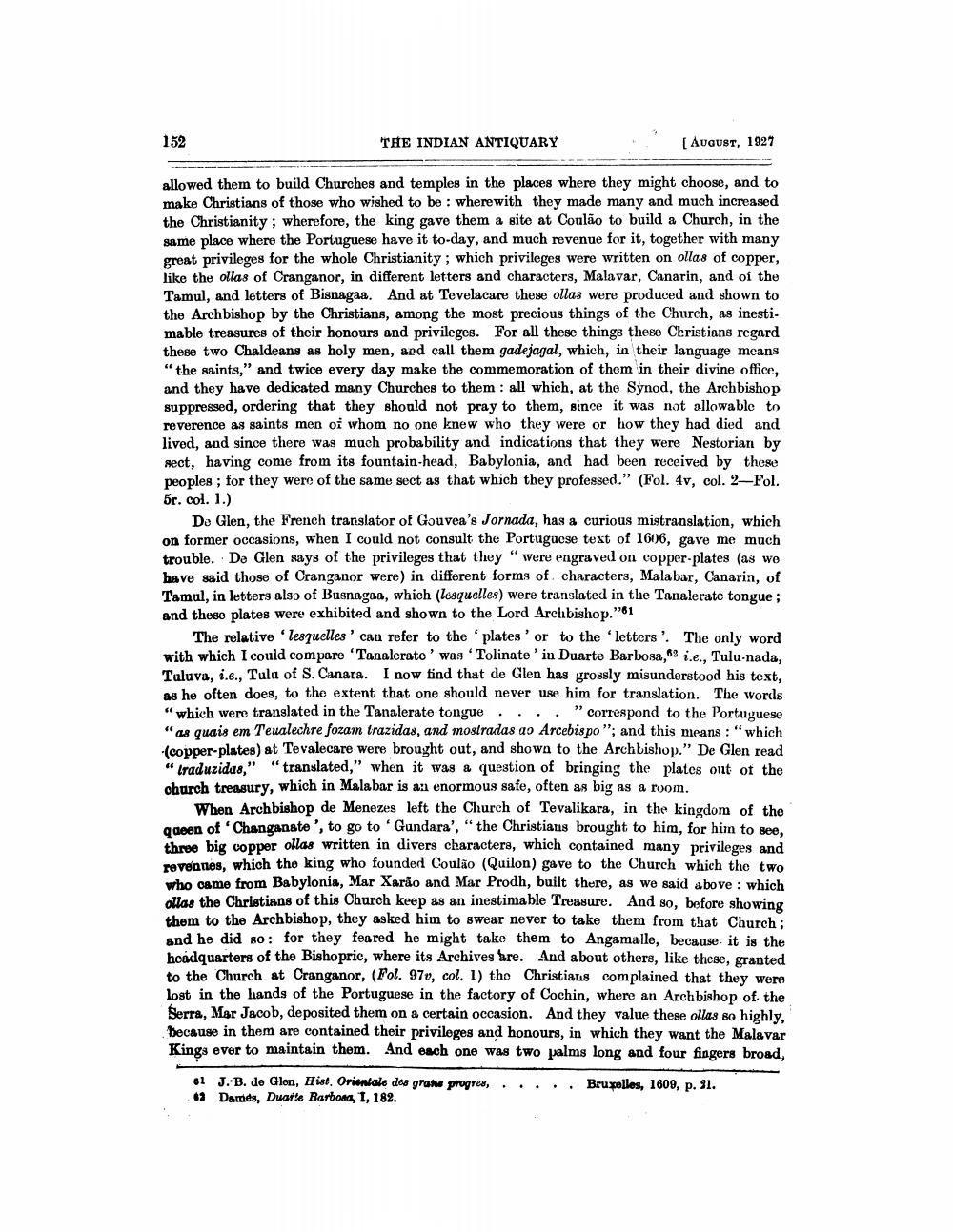________________
152
THE INDIAN ANTIQUARY
[AUGUST, 1927
allowed them to build Churches and temples in the places where they might choose, and to make Christians of those who wished to be : where with they made many and much increased the Christianity; wherefore, the king gave them a site at Coulão to build a Church, in the same place where the Portuguese have it to-day, and much revenue for it, together with many great privileges for the whole Christianity; which privileges were written on ollas of copper, like the ollas of Cranganor, in different letters and characters, Malavar, Canarin, and of the Tamul, and letters of Bisnagaa. And at Tevelacare these ollas were produced and shown to the Archbishop by the Christians, among the most precious things of the Church, as inesti. mable treasures of their honours and privileges. For all these things these Christians regard these two Chaldeans as holy men, and call them gadejagal, which, in their language means "the saints," and twice every day make the commemoration of them in their divine office, and they have dedicated many Churches to them: all which, at the Synod, the Archbishop suppressed, ordering that they should not pray to them, since it was not allowable to reverence as saints men oi whom no one knew who they were or how they had died and lived, and since there was much probability and indications that they were Nestorian by sect, having come from its fountain-head, Babylonia, and had been received by these peoples ; for they were of the same sect as that which they professed." (Fol. 4v, col. 2-Fol. 5r. col. 1.)
Do Glen, the French translator of Gouvea's Jornada, has a curious mistranslation, which on former occasions, when I could not consult the Portuguese text of 1606, gave me much trouble. Da Glen says of the privileges that they " were engraved on copper-plates (as we have said those of Cranganor were) in different forms of characters, Malabar, Canarin, of Tamul, in letters also of Busnagaa, which (lesquelles) were translated in the Tanalerate tongue; and thoso plates were exhibited and shown to the Lord Archbishop.61
The relative "lesquelles 'can refer to the plates' or to the 'letters'. The only word with which I could compare 'Tanalerate' was 'Tolinate' in Duarte Barbosa, i.e., Tulu-nada, Taluva, i.e., Tula of S. Canara. I now find that de Glen has grossly misunderstood his text, as he often does, to the extent that one should never use him for translation. The words “which were translated in the Tanalerate tongue....” correspond to the Portuguese "as quais em Teualechre fozam trazidas, and mostradas ao Arcebispo "; and this means : "which (copper-plates) at Tevalecare were brought out, and shown to the Archbishop." De Glen read “Lraduzidas," "translated," when it was a question of bringing the plates out of the church treasury, which in Malabar is an enormous safe, often as big as a room.
When Archbishop de Menezes left the Church of Tevalikara, in the kingdom of the q geen of Changanate', to go to 'Gundara', “the Christiaus brought to him, for him to see. three big copper ollas written in divers characters, which contained many privileges and reyenneswhich the king who founded Coulão (Quilon) gave to the Church which the two who came from Babylonia, Mar Xarão and Mar Prodh, built there, as we said above : which allas the Christians of this Church keep as an inestimable Treasure. And so, before showing them to the Archbishop, they asked him to swear never to take them from that Church; and he did so: for they feared he might take them to Angamallo, because it is the headquarters of the Bishopric, where its Archives are. And about others, like these, granted to the Church at Cranganor, (Fol. 970, col. 1) tho Christiaus complained that they were lost in the hands of the Portuguese in the factory of Cochin, where an Archbishop of the Serra, Mar Jacob, deposited them on a certain occasion. And they value these ollas so highly, because in them are contained their privileges and honours, in which they want the Malavar Kings ever to maintain them. And each one was two palms long and four fingers broad,
81 J. B. de Glen, Hist. Orientale des grans progres,. ... Bruxelles, 1609, p. 91. 42 Dames, Duatle Barbosa, 1, 182.




